Details And Details
Most likely it's been five minutes, since I'm sitting here, trying to gather my thoughts and start my post. Today I'd like to show you more artworks from Tamás Vass and was thinking how complex his works are and even though I've already posted twice about his artworks, there's still a lot to see and learn about. When you see an artist's works covering decades, you see the evolution in his style.
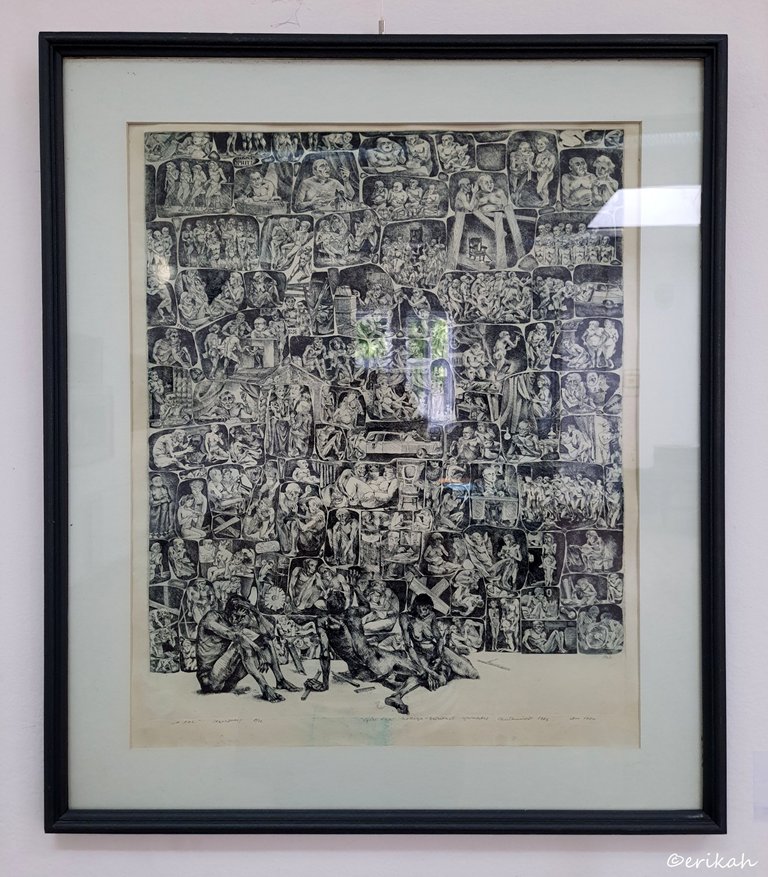
The Wall - 1980
Tamás Vass had a particular style and talking with those Hive users who commented on my posts, had to realize, his art divides people. I find it amazing, but others find it sad and/or depressing. I think it depends on how you look at it.
Quite many are judging artworks by how it would look on their walls or how it would make them feel. You can find me in that category too, especially when it comes to artworks I want to buy. However, visiting so many exhibitions teaches you to not look at them as a buyer and judge them in a different way. The funny thing is, I rarely think of these artworks like I would want to buy them. This thought occurs only when I see really exceptional works. Why? Because I know how many wonderful artworks I've seen, how little space I have available and how tight my budget for art is. Obviously, it leaves me with heart ache, but this is life, you can rarely have everything you want.
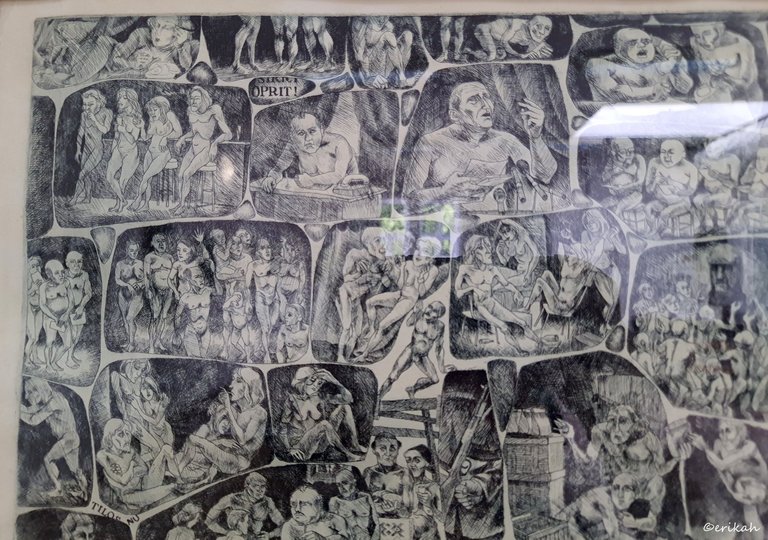
This is a close-up photo of the graphics I posted above. It's not a perfect photo, due to the glass and what comes with it, but you can see how the drawings are made and what they mean.
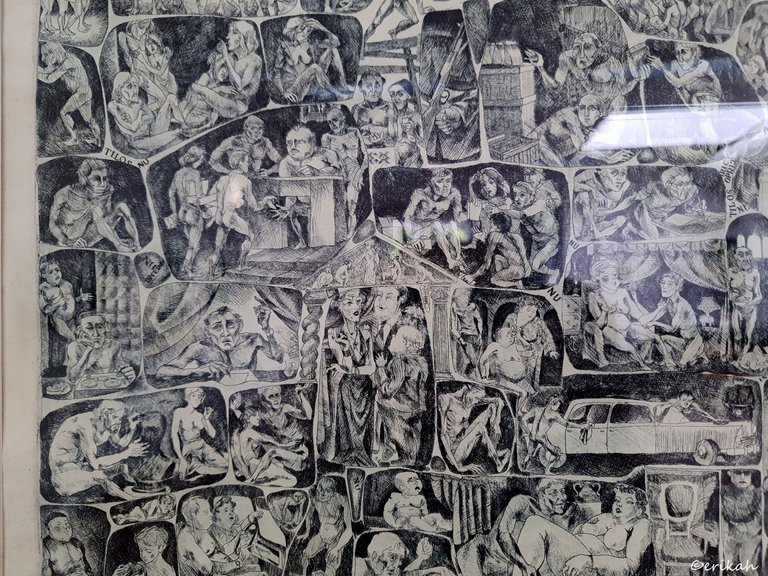
A wall in itself means delimitation, restriction and stopping people or things and so on. In this graphics there are walls everywhere, restricting people heavily. Some don't even have room to straighten their back or stand straight. Knowing this piece was created during the communist period, it has a deeper meaning than it seems to many.
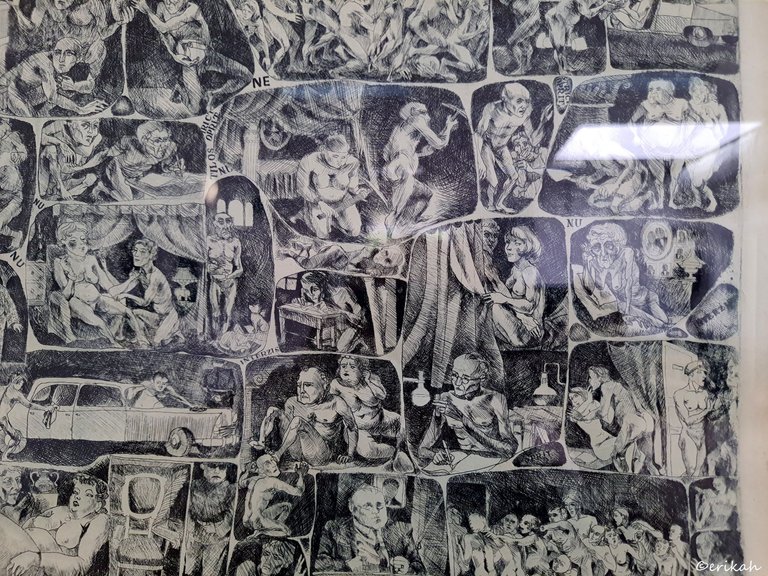
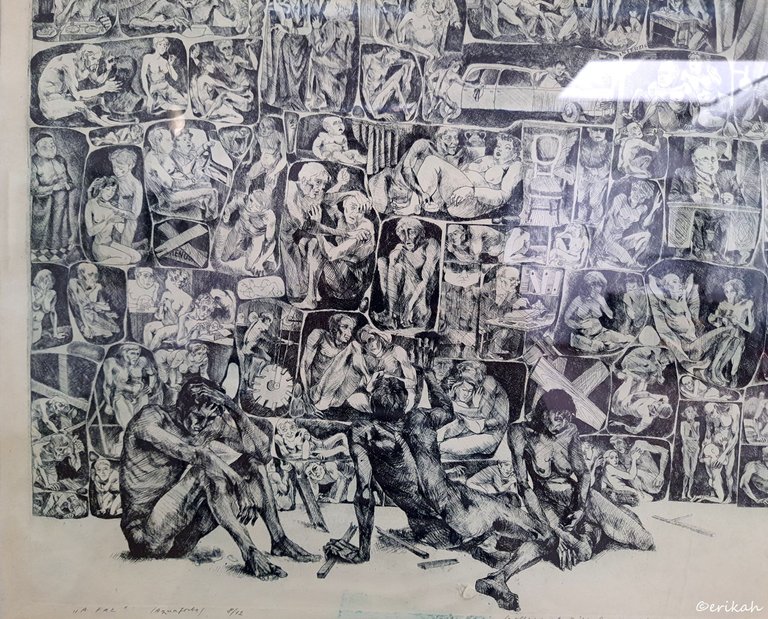
The theme is definitely heavy, looking at daily would make me sad, but it's brilliant! It requires a lot of talent to create such an artwork.
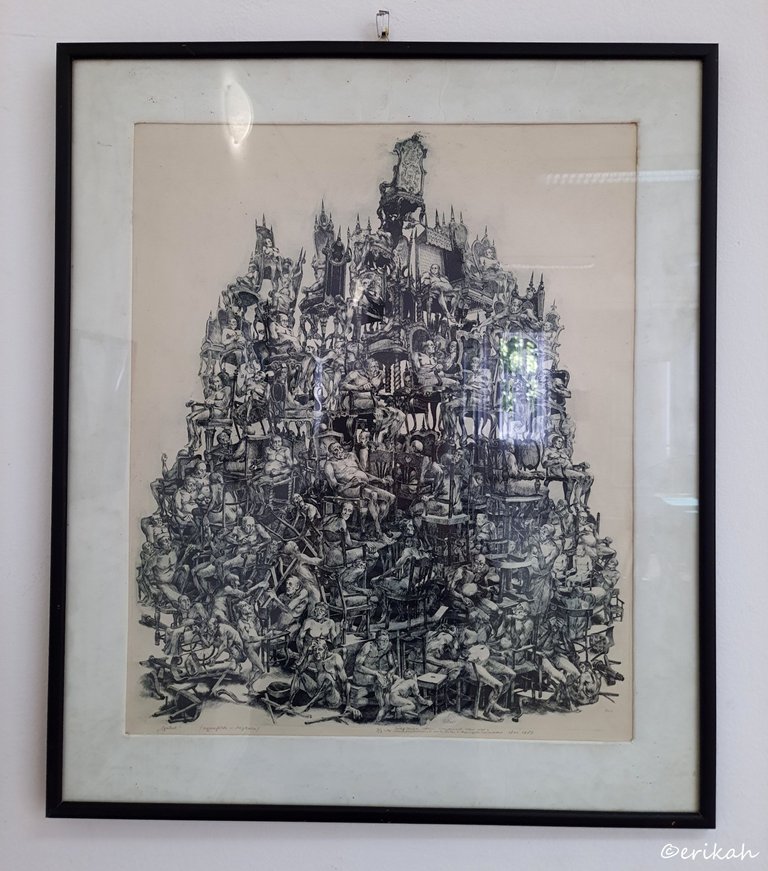
Chairs - 1983
If you think of what this graphics made of, it has two ingredients, if I can say that. People and chairs. A lot of people and a lot of chairs. It's a pyramid of people and chairs. I'm not sure, but I think it can be seen as hierarchy?
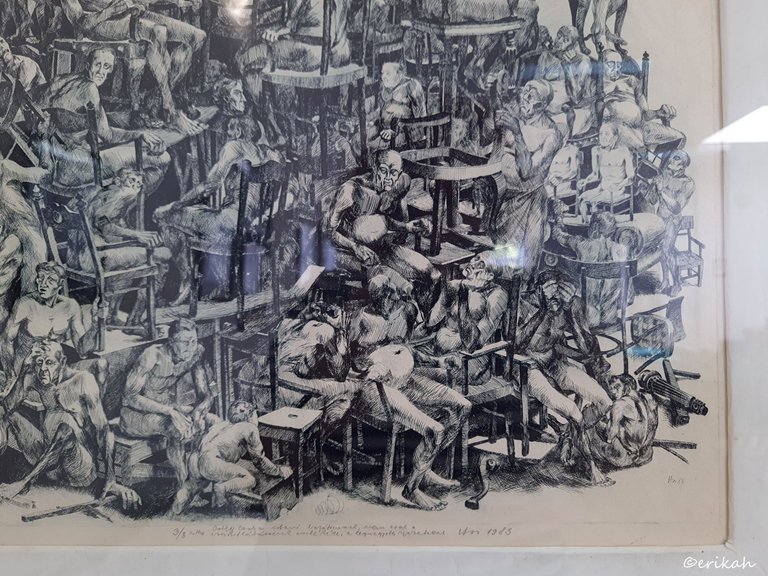
I may be reading this the wrong way (hope not), but I think the simplicity of the chairs at the bottom could mean simple, ordinary people.
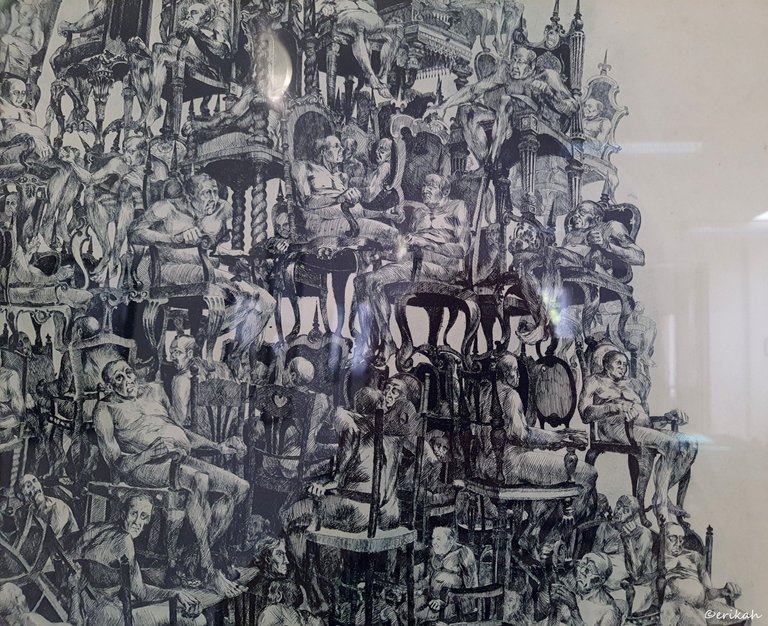
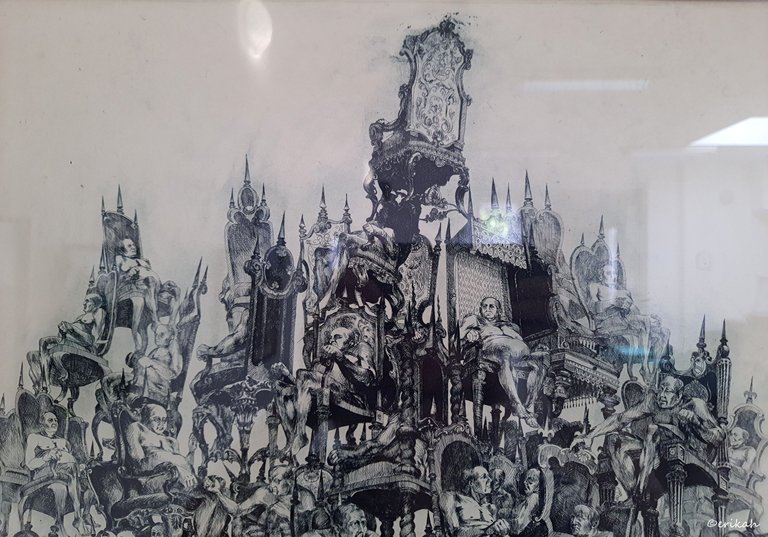
As you can see, the chairs toward the top and at the top are totally different, those are more luxurious, which symbolizes wealth. Another detail that can be noted is, how different people are. Those at the bottom look slim, while the ones at the top are fat. If we're talking about hierarchy, my theory may be correct. Working class is rarely fat as they don't have time to eat all day and also don't have much to eat. I'd love to ask the artist about the meaning of this graphics, or about what was the starting idea he had but unfortunately Tamás Vass is not among us anymore.
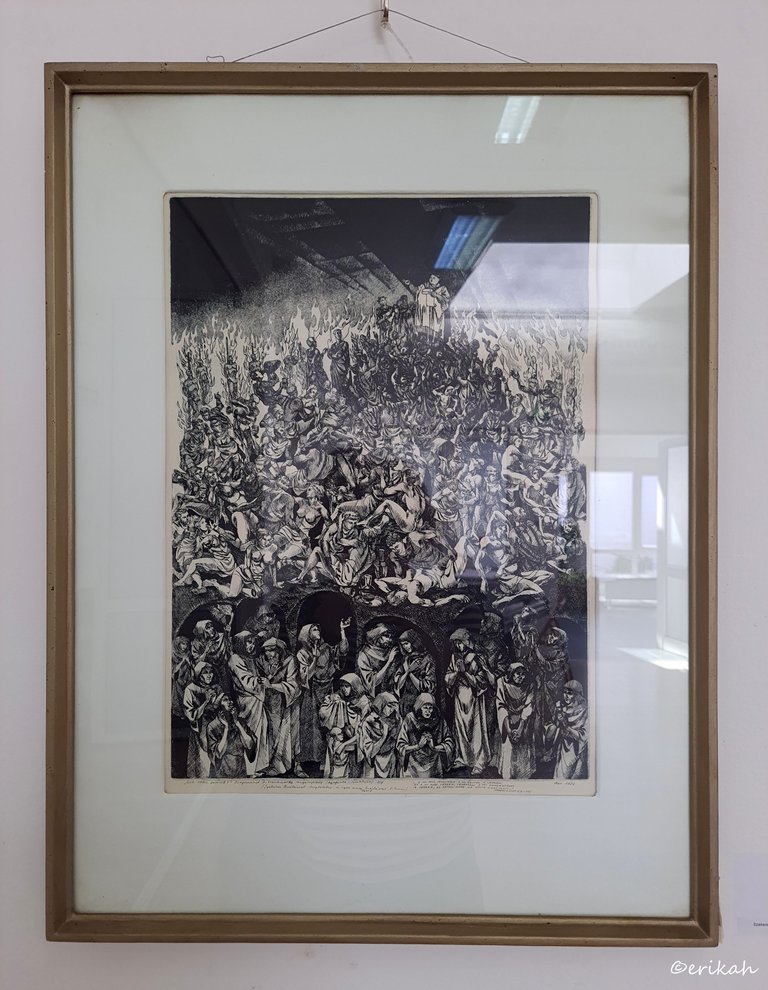
Quo Vadis, Domine? - 1986
This is a religious themed graphics and I hope I get it right. It's not easy though.
Quo vadis? is a Latin phrase meaning "Where are you going?" It is commonly translated, quoting the KJV translation of John 13:36, as "Whither goest thou?"
The phrase originates from the Christian tradition regarding Saint Peter's first words to the risen Christ during their encounter along the Appian Way. According to the apocryphal Acts of Peter (Vercelli Acts XXXV; late 2nd century AD), as Peter flees from crucifixion in Rome at the hands of the government, and along the road outside the city, he meets the risen Jesus. In the Latin translation, Peter asks Jesus, "Quo vadis?" He replies, "Romam eo iterum crucifigī" ("I am going to Rome to be crucified again"). Peter then gains the courage to continue his ministry and returns to the city, where he is martyred by being crucified upside-down. The Church of Domine Quo Vadis in Rome is built where the meeting between Peter and Jesus traditionally took place. The words "quo vadis" as a question also occur at least seven times in the Latin Vulgate. source
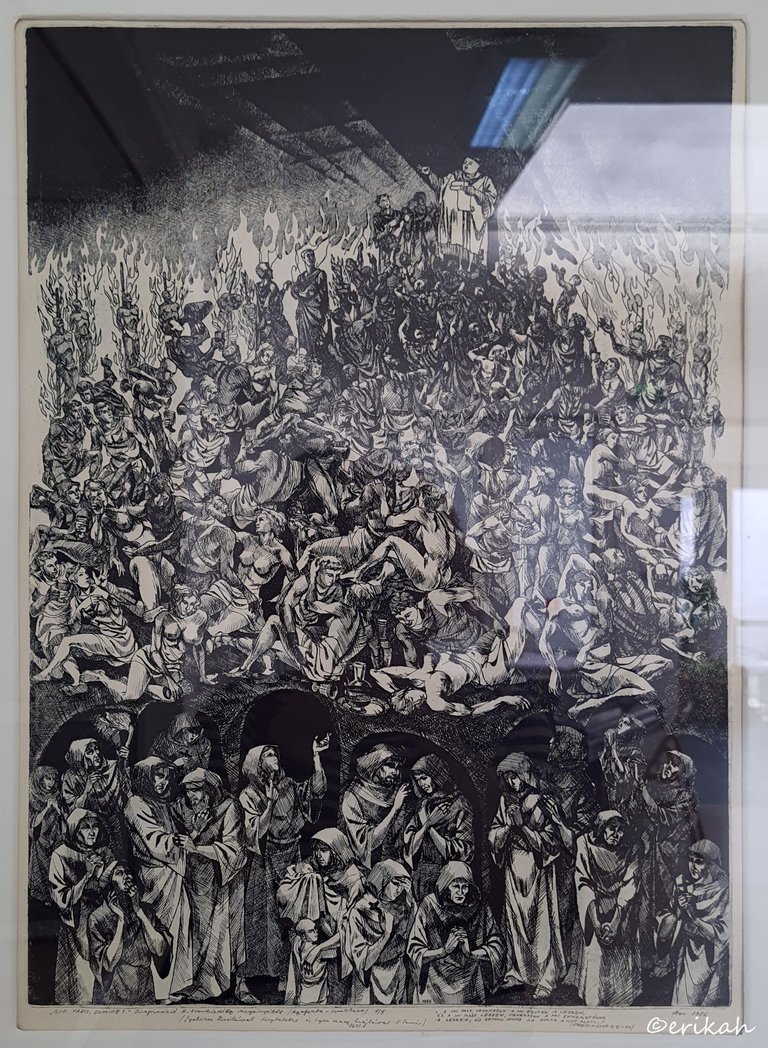
This is the cropped photo, for you to see if it is related to the biblical meaning, or not.
The reason why I'm so fascinated by this type of graphics is because the process is totally unknown to me. The other reason is the level of imagination required to carry out such a complex task. I'm totally amazed by this type or art, even if it's a bit dark and maybe carry a sad message. I still find it brilliant.
I'd like to know what you think of it.

If you're a newbie, you may want to check out these guides:
- Communities Explained - Newbie Guide
- Cross Posting And Reposting Explained, Using PeakD
- Hive Is Not For Me
- How To Pump Your Reputation Fast - Newbie Guide
- Tips And Tricks & Useful Hive Tools For Newbies
- More Useful Tools On Hive - Newbie Guide
- Community List And Why It Is Important To Post In The Right Community
- Witnesses And Proposals Explained - Newbie Guide
- To Stake, Or Not To Stake - Newbie Guide
- Tags And Tagging - Newbie Guide
- Newbie Expectations And Reality
- About Dust Vote And Hive Reward Pool, by libertycrypto27

Indeed, very detailed and I love how he used only black pens or maybe just a simple black ball point pen for this artwork. Something I am interested to learn.
I think it's ink but I'm not sure. In any case, I would definitely try it out.
Hi, I just stumbled across your post and am absolutely amazed. Thank you for the insightful analysis and for introducing me to this artwork. I will read and research on it and come back with a more profound answer. Just on a quick note - I absolutely get you. There is a power in these works, dark but yet very impressive. It is very distopic though, will do some research on him. However thank you again!
I think one of the elements of Tamás Vass work is people living life even in hard times. The heirachy and walls limit them and are omnipresent but people are still finding love, having babies, getting by...
Chairs reminds me of the famous line from Animal Farm "All animals are equal, but some animals are more equal than others." Animal Farm was taught in all the US schools during the Cold War.
❤
I love those paintings full of details, from far away maybe a big smudge or a big splotch but when you take the time to get closer and look closely you find a lot of stories.
These are very interesting and detailed works, I don't think I've seen anything like this. @erikah how often do you go for exhibitions 😃
Well, I can't say exactly, but these exhibitions change every two weeks and there are like 3 or 4 galleries I regularly visit. Plus museums if they have a new exhibition open.
That's great. Not so many people visit these places anymore.
🤩 !PGM
Beautiful frame
Absolutely love the Where's Waldo level of detail on it. I like Hieronymus Bosch paintings for the same reason (that and some crazy creature design).